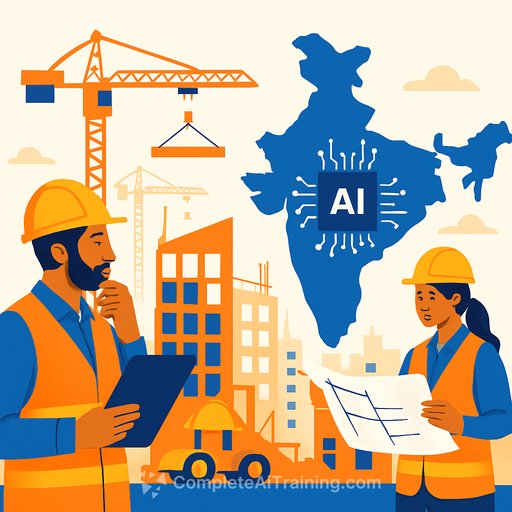India Construction Industry Report 2025-2034
Market Players Embrace BIM and AI Technologies to Boost Efficiency and Project Delivery
The Indian construction market reached USD 687.38 billion in 2024 and is set to grow at a CAGR of 8.60% from 2025 to 2034. This growth will push the market size to nearly USD 1.56 trillion by 2034. Key players are increasingly adopting Building Information Modeling (BIM) and Artificial Intelligence (AI) to improve project efficiency and delivery timelines.
Indian Construction Market Growth
Government initiatives focused on socio-economic development are driving construction activity. Projects like Parvatmala, which supports bridge construction at major pilgrimage sites in Uttarakhand, highlight this push. Mumbai is expected to see investments worth $60 billion over the next 5-7 years, targeting infrastructure that enhances connectivity and supports its emergence as an IT hub.
Road development efforts are also underway to ease Mumbai’s severe traffic congestion, where there are about 2000 cars per kilometer of road. Additionally, the luxury real estate sector is expanding due to rising demand for premium living spaces.
Infrastructural investments have increased demand for TMT (thermo-mechanically treated) bars—strong, earthquake-resistant steel reinforcement materials. These bars accounted for nearly 42% of India’s steel production in 2023, with demand expected to grow alongside advances in construction technologies and sustainable infrastructure.
Indian Construction Market Share
The market is segmented by end-use into commercial, residential, industrial, and infrastructure sectors. While all segments are projected to grow, infrastructure is poised to take the largest share. This is largely due to government spending aimed at attracting new business and stimulating economic growth.
Leading Companies in the Indian Construction Market
The market features several key players actively expanding their capacity and capabilities through mergers, acquisitions, and investments:
- Larsen & Toubro Limited
- Reliance Infrastructure Ltd.
- Punj Lloyd Limited
- Shapoorji Pallonji Co. Pvt. Ltd
- GMR Infrastructure Limited
- Tata Projects
- Gammon India Limited
- KEC International Limited
- Welspun Group
- Others
Key Topics Covered in the Report
- Executive Summary – Market size, growth forecast, demand drivers, competitive structure, and recent trends
- Market Overview and Stakeholder Insights – Trends, key verticals and regions, supplier and buyer power, opportunities, risks, and stakeholder initiatives
- Economic Summary – GDP outlook, inflation, democracy index, public debt, balance of payments, population, and urbanisation trends
- Country Risk Profiles – Business climate and risk assessment
- Indian Economy Outlook – Population, inflation, GDP, and income demographics
- Government Initiatives and Policies
- Indian Construction Market Overview – Historical data and forecasts
- Market by End-Use – Commercial (including healthcare, retail, sports), residential, industrial, and infrastructure sectors
- Market by Region – North, East & Central, West, and South India
- Market Dynamics – SWOT and Porter’s Five Forces analysis, demand and price indicators
- Value Chain Margin Analysis
- Cost Structure – Materials, labor, machinery, utilities, transportation
- Competitive Landscape – Supplier selection, global and regional players, strategies, and company profiles
This comprehensive outlook offers valuable insights for professionals in real estate and construction aiming to understand market trends and plan strategic moves. For those interested in how AI is shaping industries including construction, exploring detailed AI courses might be worthwhile. Visit Complete AI Training’s latest AI courses to see how AI tools can improve efficiency and project management.
Your membership also unlocks:





